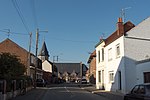The Attack at Fromelles (French pronunciation: [fʁɔmɛl] (Battle of Fromelles, Battle of Fleurbaix or Schlacht von Fromelles) 19–20 July 1916, was a military operation on the Western Front during the First World War. The attack was carried out by British and Australian troops and was subsidiary to the Battle of the Somme. General Headquarters (GHQ) of the British Expeditionary Force (BEF) had ordered the First Army (General Charles Munro) and Second Army (General Herbert Plumer) to prepare attacks to support the Fourth Army on the Somme, 50 mi (80 km) to the south, to exploit any weakening of the German defences opposite. The attack took place 9.9 mi (16 km) from Lille, between the Fauquissart–Trivelet road and Cordonnerie Farm, an area overlooked from Aubers Ridge to the south. The ground was low-lying and much of the defensive fortification by both sides consisted of building breastworks, rather than trenches.
The operation was conducted by XI Corps (Lieutenant-General Richard Haking) of the First Army with the 61st (2nd South Midland) Division and the 5th Australian Division of the Australian Imperial Force (AIF) against the 6th Bavarian Reserve Division, supported by the two flanking divisions of the German 6th Army. Preparations for the attack were rushed, the troops involved lacked experience in trench warfare and the power of the German defence was significantly underestimated, the attackers being outnumbered 2:1. The advance took place in daylight, on a narrow front, against defences overlooked by Aubers Ridge, with German artillery on either side free to fire into the flanks of the attack. Another attack by the 61st (2nd South Midland) Division early on 20 July was cancelled, after it was realised that German counter-attacks had already forced a retirement by the Australian troops to the original front line.
On 19 July, General Erich von Falkenhayn, head of Oberste Heeresleitung (OHL, the German army supreme headquarters) judged Fromelles to be the offensive he expected against the 6th Army. The attack gained no ground but inflicted some casualties; next day the failure was evident and a captured operation order from XI Corps revealed the limited nature of the operation. In 2012, a study of German records showed that none of the German divisions opposite XI Corps moved to the Somme until four to nine weeks later; Falkenhayn sent divisions from the Souchez–Vimy area, 20 mi (32 km) south instead, which has been misinterpreted in earlier accounts. The attack was the début of the AIF on the Western Front and the Australian War Memorial described it as "the worst 24 hours in Australia's entire history". Of 7,080 BEF casualties, 5,533 were suffered by the 5th Australian Division; the Germans suffered 1,600–2,000 casualties and lost 150 prisoners.











